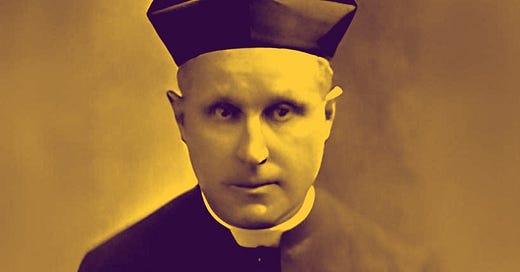O Emmanuel, our King and Lawgiver, the Desire of all nations, and their Saviour: Come and save us, O Lord our God.
Fr Frank L. Vernon (1873-1944) was a Canadian priest who served most of his ministry in the United States. His Locust Street Letters, excerpted below, give sound spiritual advice to his flock, drawn from the Anglican tradition of the Book of Common Prayer. As we come to the end of our Advent pilgrimage, Fr Vernon spells out uncompromisingly what It is that we approach at Christ’s Mass and how we are to approach It: which is to say, the very Body and Blood of Our Lord that was held in the crib comes to us under Bread and Wine, and we are to approach the Sacrament as we approach the Lord our Judge and Saviour Himself, with penitence and confession, one-to-one with a priest if the gravity of our sins so demands. If it is an unfamiliar practice to you, I can assure you of its great spiritual benefits in the struggle to conform our souls to God’s will. It is not too late to seek out a priest to make your confession before Christmas if you have not yet done so. Even those who come at the eleventh hour receive their reward. —T.P.
Locust Street Letters
Philadelphia: St. Mark's Church, Locust Street.
THE FOURTH SUNDAY IN ADVENT, 1929.
MY DEAR PEOPLE:
On this day we are left expectant, waiting for the great event. Our eyes are already turning toward Bethlehem. Yet this very fact presses upon us the remembrance of the necessity of preparation. He is coming. But are we prepared to receive Him?
The best manual of instruction upon this whole subject is the Book of Common Prayer. I shall quote from it. Its language is authoritative, familiar and plain.
1. Wherefore it is our duty to render most humble and hearty thanks to Almighty God, our heavenly Father, for that He has given his Son our Saviour Jesus Christ, not only to die for us, but also to be our spiritual food and sustenance in that holy Sacrament.
2. The way and means thereto is: First, to examine your lives and conversations by the rule of Gods commandments; and whereinsoever ye shall perceive yourselves to have offended, either by will, word, or deed, there to bewail your own sinfulness, and to confess yourselves to Almighty God, with full purpose of amendment of life.
3. If there be any of you, who by this means cannot quiet his own conscience herein, but requireth further comfort or counsel, let him come to me, or to some other Minister of God’s Word, and open his Grief.
4. Almighty God, the Father of our Lord Jesus Christ, who desireth not the death of a sinner, but rather that he may turn from his wickedness and live, hath given power and commandment to his Ministers, to declare and pronounce to his people, being penitent, the Absolution and Remission of their sins.
4. Receive the Holy Ghost for the Office and Work of a Priest in the Church of God, now committed unto thee by the Imposition of our hands. Whose sins thou dost forgive, they are forgiven.
In these words the Anglican teaching, and in other words of identical import the teaching of each and every Communion of the Holy, Catholic and Apostolic Church throughout the world, directs us to the Sacrament of Penance, as the means whereby we cleanse our consciences and purify our hearts for the coming of Our Lord and Saviour.
The rubric directs that the Priest shall then place upon the Table so much Bread and Wine as he shall think sufficient and lay his hand upon all the bread and say, and when He had given thanks, He brake it, and gave it to His disciples, saying, Take, eat, this is my Body. He is directed to take the Cup into his hands, and to say, Likewise after supper, He took the Cup; and when He had given thanks, He gave it to them, saying, Drink ye all of this; for this is my Blood.
After these words that which is upon the Altar is declared to be the most blessed Body and Blood; The most precious Body and Blood of thy Son Jesus Christ; The Body of our Lord Jesus Christ; The Blood of our Lord Jesus Christ; The most precious Body and Blood of thy Son our Saviour Jesus Christ.
To wrest these words from their plain meaning is to deliver into the hands of the enemy, the spiritual Mother who bare us.
I can understand why conscientious Protestants divest these words of their meaning. I can understand why conscientious Roman Catholics do so. But why and how Anglicans can do so, passes my comprehension. Thank God You understand plain English and believe in your religion.
Affectionately in Our Lord,
Frank Lawrence Vernon
https://anglicanhistory.org/usa/flvernon/1929advent4.html
O Lord Jesu Christ, Who wast foretold as the king
in whom God would manifest his presence,
Who should reign in righteousness,
bringing peace and happiness to all peoples;
Thou art Thyself indeed Emmanuel,
the very Son and Word of God made man:
Come, we pray Thee, by Thy grace, and reign over us,
so saving us from our spiritual enemies
and from the hand of all that hate us,
that we may serve Thee without fear
in holiness and righteousness
all the days of our life.(The Advent Antiphons With Scripture references and paraphrases. By A.C.A. Hall, Bishop of Vermont.)





